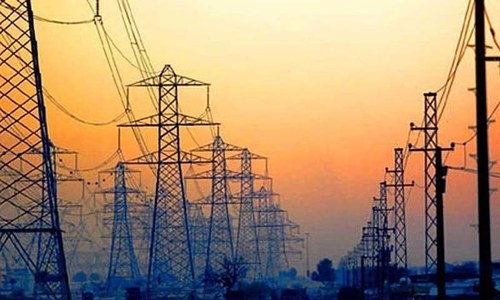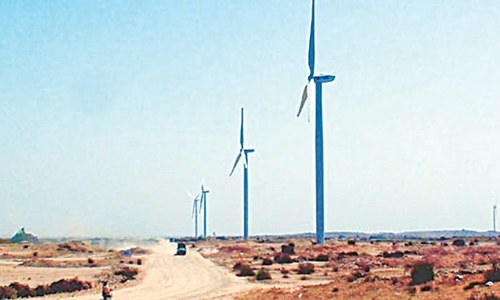ISLAMABAD: The government has reconstituted a high-level committee for implementation of memorandums of understanding (MoUs) signed with independent power producers (IPPs) at the earliest.
According to a notification issued by the power division, Adviser to the Prime Minister on Finance and Revenue Dr Abdul Hafeez Shaikh has replaced Energy Minister Omar Ayub Khan as head of the committee while Tabish Gauhar has replaced Shahzad Qasim. All other members of the committee remain unchanged.
The notification has been issued on the basis of a decision taken by the federal cabinet on Sept 29. Informed sources said some participants of the cabinet meeting had reservations over the energy minister leading the committee.
The notification said the committee had been reconstituted to take further actions on implementation of negotiation outcomes with the IPPs.
The new committee, headed by Dr Shaikh, comprises Special Assistant to the Prime Minister on Power Tabish Gauhar, Federal Land Commission Chairman Babar Yaqoob Fateh Mohammad, who led the negotiations with the IPPs, the secretaries of power and finance and Barrister Qasim Wadud and the chief executive of the Central Power Purchasing Agency Guarantee Ltd.
Hafeez Shaikh replaces Omar Ayub as head of the high-level committee
The committee will be responsible for undertaking all actions required to give effect to the MoUs and their conversion into binding contractual agreements, within the timeline (six months) agreed in the MoUs. It coordinates with all relevant ministries, institutions, authorities and other stakeholders for the IPPs which have not signed MoUs, as provided in the report. The committee will have powers to make contractual arrangements on the same principles and lines as for the IPPs which have signed the MoUs.
The committee will also be responsible for devising a mechanism for settlement of outstanding dues of the IPPs and in case the matter was under litigations, the relevant MoU will be forwarded to the relevant entity for its comments and feedback.
The panel will be responsible for those arbitrations or dispute resolution decisions that are not implemented, recommend a way forward to close out such disputes, possibly including a previously agreed settlement that was not put into effect and for settlement of outstanding tax issues of the industry, and make attempts to reach closure on the subject.
The committee will also take necessary action for revision of tariff through the National Electric Power Regulatory Authority pursuant to relevant terms of the MoUs and monitor amendment to the power purchase agreements and other relevant deals pursuant to the MoUs and revised tariff determination.
The committee, in the performance of its duties, will co-opt experts or officers from any government department, institution, agency, regulatory body, private sector, etc, and seek record and information from the government and private sector organisations, regulatory bodies, etc, as deemed appropriate for its tasks.
The committee will also have powers to set up subcommittees as it deemed fit. In its official summaries to the Cabinet Committee on Energy and the cabinet, the IPPs negotiation committee and power division have been claiming about Rs836-866 billion savings over up to 28 years remaining life of 47 IPPs.
To materialise these savings, the government was required to clear about Rs400bn outstanding dues to the IPPs at once. The negotiation committee held talks with the IPPs under and before 1994 policy, 2001 policy and renewable power policy of 2006 (including bagasse plants under the 2018 co-generation framework). The IPPs, under the 2015 policy, were not included in the mandate of the committee.
The negotiation committee had reported that Hub Power Company, which had the remaining life of seven years, agreed on removal of dollar and US CPI indexation on returns. Its fixed O&M (operation & maintenance) will be reduced by 11 per cent with a financial impact of Rs62bn.
Under the 1994 generation policy, six IPPs had remaining life of 6-10 years, while Kot Addu Power Company’s life is one year. The MoUs reduced by 11pc in capacity payments and variable O&M and dollar delinking for 50pc of remaining capacity payment. This is reported to have Rs92bn financial impact.
Likewise, 12 IPPs, under the 2002 policy, had remaining life of 14-21 years. Their MoUs involved 12pc dollar-based return for foreign investors, 17pc return at Rs148 per dollar with no further indexation for local investors with a clawback mechanism for fuel and O&M savings and recovery of past excess payments. Its financial impact was estimated at Rs322bn.
Under the 2006 renewable energy (wind and solar) policy, 19 IPPs have remaining life of 12-19 years. The MoUs envisaged a reduction to 13pc dollar-based return, reduction in O&M cost by 15pc to 25pc and 50pc reduction in tariff above agreed benchmark. This is reported to have a financial impact of Rs206bn.
The 2013 baggasse-based eight projects (under the 2006 policy) had remaining life of 4-28 years. Their MoUs involved a reduction to 12pc dollar-based return for the next five years and shift to rupee-based 17pc return at Rs168 per dollar and 70pc clawback mechanism for agreed benchmarks. Their O&M cost had been reduced by 10pc and they would return past excess payments. This will have an estimated financial impact of Rs150bn.
Published in Dawn, October 13th, 2020














































